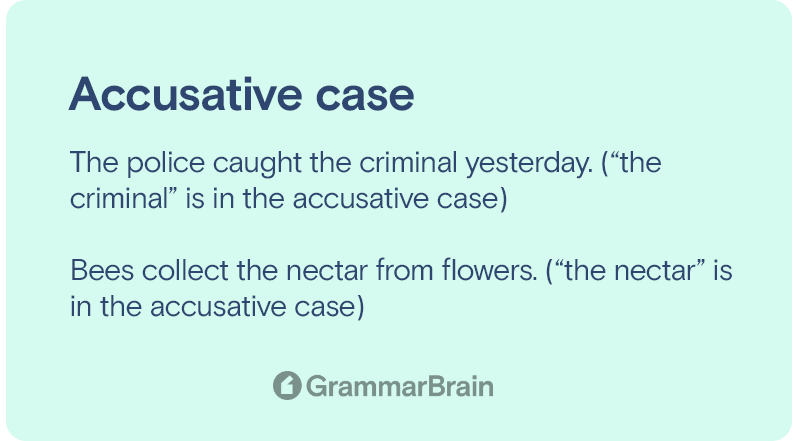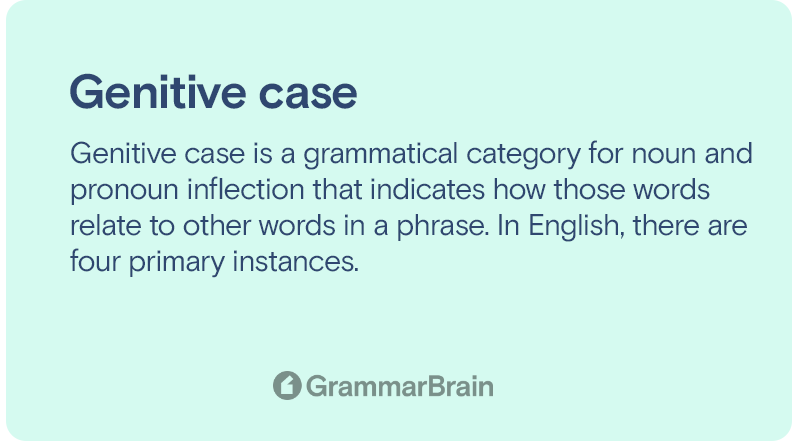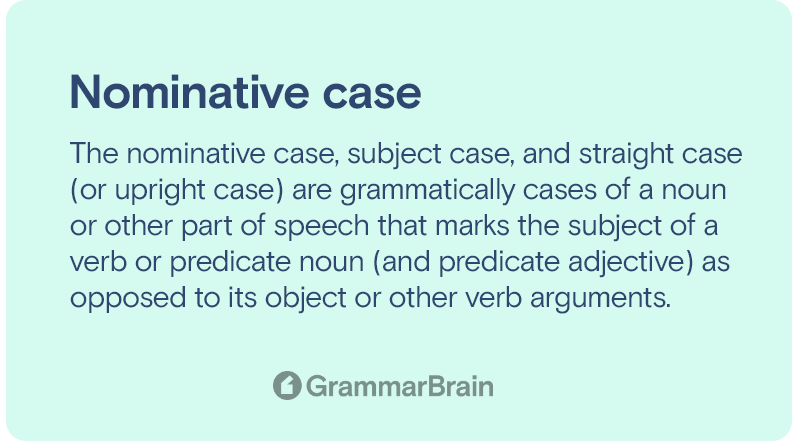What is the accusative case? The term “accusative case” would be more familiar to the non-English speaking population, predominantly Russian and German. In the English language, accusative cases play an important role in a sentence. The term may sound complicated, but it is very simple to understand as it describes a fundamental grammatical property.
First, let’s understand the meaning of an accusative case.
What is an accusative case?
Before you learn about the accusative case, understand the different cases in the English language.
A case in the English language pertains to how a word changes and is used in a sentence. Cases tell you how a word stands in relation to other words in a sentence syntactically.
Typically, there are three cases in the English language – the possessive case, the subject case, and the object case.
- The subject case shows the word or words (person, thing, animal, etc.) which act.
- The object case reveal the word or words on whom the action is performed.
- The possessive case highlights belonging or ownership of the object.
- The nominative case, indicating that a noun or pronoun is the subject.
- The genitive case, marks a word, usually a noun, as modifying another word.
Here is an example:
- I, me, mine.
In this sentence, “I” is the subject case, “me” is the object case and “mine” is the possessive case.

Understanding accusative case
Like mentioned, the accusative case reveals the direct object on which an action is performed. This case is not commonly used in English, but here is an example to understand the concept –
- He walked the dog today.
To discover the accusative case in the sentence, ask the question “What” or “Whom” does the verb affect? The verb in the sentence is “walked.”
So ask the question, “Walked what or whom?”. The answer is the object of the sentence “the dog,” which is in the accusative case.

Examples of accusative case
Here are some examples of sentences in the accusative case –
- The police caught the criminal yesterday. (“the criminal” is in the accusative case)
- Bees collect the nectar from flowers. (“the nectar” is in the accusative case)
In this sentence, both “nectar” and “flowers” are objects. However, “nectar” is the direct object of the verb “collect”. On the other hand, “flowers” is an indirect object. So, “the nectar” is in the accusative case.
- People often mistake each other for actors in Hollywood. (“each other” is in the accusative case)
- Hand the box to the workers upstairs. (“the box” is in the accusative case)
- The teacher punished her for a late submission.
- Don’t tax the poor, tax the rich (“the poor” and “the rich” are both is in the accusative case)
- He impressed her with his organizational skills. (“her” is in the accusative case)
- Dogs often bark at strangers. (“strangers” is in the accusative case)
Accusative case vs. objective case
As mentioned earlier, the accusative case is not common in the English language. Other languages use this grammatical case to form sentences.
For the sake of convenience, the English language uses objective case to define accusative cases along with dative cases.
A dative case reveals the indirect object of a verb, the object which receives the direct object. Here is an example:
- She gave him a bottle of water.
The direct object in the sentence is “water”. Now ask yourself these questions:
- What is the verb? – The verb is “gave”.
- What was given? – “bottle of water” was given.
- To whom was it given? – It was given to “him”.
- Since “him” is the indirect object in the sentence, it is in the dative case.
How prepositions can take the accusative case
In other languages, some prepositions can assume the accusative case.
Take German for example. German prepositions like “um”, “ohne”, “gegen”, “fur”, “entlang”, “durch” and “bis” take the accusative case.
In comparison, the prepositions in the English language assume the objective case. For example, you don’t say “With I”. Instead, the correct way to say it is “With me”, which is in the objective case.
Examples
Here are some examples of prepositions in the objective case.
- This gift is from them (“them” is the objective case of “they”)
- Take a loan from her (“her” is the objective case of “she”)
Accusative case grammar rules
Here are some rules regarding the use of accusative case –
- The accusative case is used for a noun.
- The noun must be a direct object of the verb in the sentence.
- The noun can also be the object of specific prepositions.
- Indirect objects cannot be in the accusative case.

FAQs
Does English have accusative case?
Accusative cases are uncommon in the English language.
How many cases are there in English?
There are three primary cases in English – subject case, object case, and possessive case.
Can indirect objects be in the accusative case?
No, only direct objects of the verb in a sentence can be in the accusative case.
What is the use of accusative case?
The accusative case answers the question “Whom” or “What” was directly affected by the verb in a sentence.
How does a transitive verb interact with the accusative case?
In English, the case used to describe the immediate object on which the transitive verb acts.
What is an accusative object?
An accusative object is a verb that renames the action.
Inside this article
Fact checked:
Content is rigorously reviewed by a team of qualified and experienced fact checkers. Fact checkers review articles for factual accuracy, relevance, and timeliness. Learn more.
Core lessons
Glossary
- Abstract Noun
- Accusative Case
- Anecdote
- Antonym
- Active Sentence
- Adverb
- Adjective
- Allegory
- Alliteration
- Adjective Clause
- Adjective Phrase
- Ampersand
- Anastrophe
- Adverbial Clause
- Appositive Phrase
- Clause
- Compound Adjective
- Complex Sentence
- Compound Words
- Compound Predicate
- Common Noun
- Comparative Adjective
- Comparative and Superlative
- Compound Noun
- Compound Subject
- Compound Sentence
- Copular Verb
- Collective Noun
- Colloquialism
- Conciseness
- Consonance
- Conditional
- Concrete Noun
- Conjunction
- Conjugation
- Conditional Sentence
- Comma Splice
- Correlative Conjunction
- Coordinating Conjunction
- Coordinate Adjective
- Cumulative Adjective
- Dative Case
- Determiner
- Declarative Sentence
- Declarative Statement
- Direct Object Pronoun
- Direct Object
- Diction
- Diphthong
- Dangling Modifier
- Demonstrative Pronoun
- Demonstrative Adjective
- Direct Characterization
- Definite Article
- Doublespeak
- False Dilemma Fallacy
- Future Perfect Progressive
- Future Simple
- Future Perfect Continuous
- Future Perfect
- First Conditional
- Irregular Adjective
- Irregular Verb
- Imperative Sentence
- Indefinite Article
- Intransitive Verb
- Introductory Phrase
- Indefinite Pronoun
- Indirect Characterization
- Interrogative Sentence
- Intensive Pronoun
- Inanimate Object
- Indefinite Tense
- Infinitive Phrase
- Interjection
- Intensifier
- Infinitive
- Indicative Mood
- Participle
- Parallelism
- Prepositional Phrase
- Past Simple Tense
- Past Continuous Tense
- Past Perfect Tense
- Past Progressive Tense
- Present Simple Tense
- Present Perfect Tense
- Personal Pronoun
- Personification
- Persuasive Writing
- Parallel Structure
- Phrasal Verb
- Predicate Adjective
- Predicate Nominative
- Phonetic Language
- Plural Noun
- Punctuation
- Punctuation Marks
- Preposition
- Preposition of Place
- Parts of Speech
- Possessive Adjective
- Possessive Determiner
- Possessive Case
- Possessive Noun
- Proper Adjective
- Proper Noun
- Present Participle
- Prefix
- Predicate



